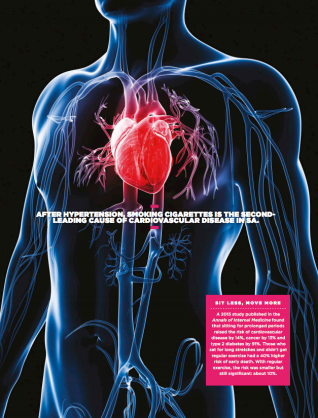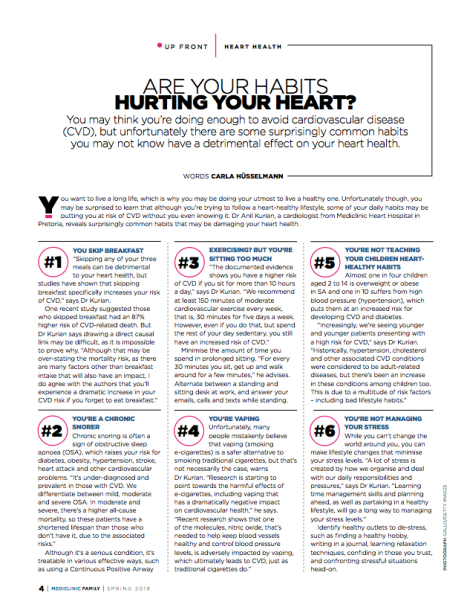You may think you’re doing enough to avoid cardiovascular disease, but unfortunately there are some surprisingly common habits you may not know have a detrimental effect on your heart health.
You want to live a long, healthy life, which is why you may be doing your utmost to avoid becoming one of those one in five South Africans who have heart attacks every hour and one in 10 South Africans who have strokes every hour. Although cardiovascular disease (CVD) is South Africa’s biggest killer after HIV/AIDS, you may already know that 80% of heart disease and strokes can be prevented by ensuring you don’t fall prey to the main harmful habits that herald heart disease: eating poorly, carrying too much weight, not exercising, drinking too much alcohol and smoking.
Unfortunately though, you may be surprised to learn that although you’re trying to follow a heart-healthy lifestyle, some of your daily habits may be putting you at risk of CVD without you even knowing it. Dr Anil Kurian, a cardiologist from Mediclinic Heart Hospital in Pretoria, reveals surprisingly common habits that may be damaging your heart health.

1. You skip breakfast
Breakfast is literally the most important meal of the day. “Skipping any of your three meals can be detrimental to your heart health, but studies have shown that skipping breakfast specifically significantly increases your risk of CVD,” says Dr Kurian.
One recent study published in the Journal of the American College of Cardiology reports that people who never ate breakfast had an 87 percent higher risk of death caused by CVD than people who ate breakfast every day. “Although that may be over-stating the mortality risk, as there are many other confounding factors other than breakfast intake that will have an impact too, I do agree with the study authors that you’ll experience a dramatic increase in your risk for CVD if you forget to eat breakfast,” says Dr Kurian.
Early-morning kilojoules are vital for jumpstarting your body’s metabolism, giving you the vital energy and nutrients you need to start your day. Skipping it can lead to hypertension (high blood pressure), higher levels of ‘bad’ cholesterol and changes in appetite, which see you overeating. This in turn leads to a higher risk for obesity, type 2 diabetes and CVD.
2. You’re a chronic snorer
Often snoring is shrugged off as a natural part of ageing – or written off as another unfortunate side effect of weight gain. However, if you or your partner are a frequent loud snorer, where you stop breathing, gasp or choke during your sleep, experience excessive restlessness at night and feel tired during the day, this common habit may point to something more worrying. Chronic snoring is often the sign of a condition called obstructive sleep apnoea (OSA), which significantly raises your risk for diabetes, obesity, hypertension, stroke, heart attack and other cardiovascular problems.
“It’s unfortunately under-diagnosed and very prevalent in those with CVD,” says Dr Kurian. “We distinguish between mild, moderate and severe OSA. In moderate and severe, there’s a higher all-cause mortality, so these patients definitely live shorter than those who don’t have it, due to the associated risks.”
Although it’s a very serious condition, it’s treatable with various effective treatments such as the use of a Continuous Positive Airway Pressure device (CPAP), advises Dr Kurian. “Lifestyle changes such as weight loss and exercise will help too,” he adds.
3. Exercising? But you’re sitting too much
Sitting for too long is increasing your risk of CVD, even if you exercise regularly. “The documented evidence shows you have a higher risk of CVD if you sit for more than 10 hours a day,” says Dr Kurian. “We recommend at least 150 minutes of moderate cardiovascular exercise every week, that is, 30 minutes for five days a week. However, even if you do that, but spend the rest of your day sedentary – that is, sitting at work, on your phone, in the car, on public transport and on your couch, for example – you still have an increased risk of CVD.”
Minimise the amount of time you spend in prolonged sitting and break up long periods of sitting as often as possible. “For every 30 minutes you sit, get up and walk around for a few minutes,” he advises. Consider alternating between a standing and sitting desk at work, answer your emails, calls and texts on your phone while standing, and watch your TV standing or do the ironing at the same time.
4. You’re vaping
After hypertension, smoking cigarettes is the second leading cause of CVD and, globally, nearly 6 million people die from tobacco use or exposure to secondhand smoke every year, according to the Heart and Stroke Foundation of South Africa (HSFSA).
Unfortunately many people mistakenly believe that vaping (smoking e-cigarettes) is a safer alternative to smoking traditional cigarettes, but it isn’t, says Dr Kurian. “Research is starting to point towards the deletrious effects of e-cigarettes, including vaping that has a dramatically negative impact on cardiovascular health,” he says. “Recent research from the US’s Cardiovascular Research Institute at the University of California, San Francisco shows that one of the molecules, nitric oxide, that’s needed to help keep blood vessels healthy and control blood pressure levels, is adversely impacted by vaping, which ultimately leads to CVD, just like traditional cigarettes do.”
5. You’re not teaching your children heart-healthy habits
Almost one in four children aged 2 to 14 are overweight or obese in SA and one in 10 suffer from high blood pressure (hypertension), which puts them at an increased risk for developing CVD and diabetes, reports the HSFSA.
“Increasingly, we’re seeing younger and younger patients presenting with a high risk for CVD,” says Dr Kurian. “Historically, hypertension, cholesterol and other associated CVD conditions were considered to be adult-related diseases, but there’s been an increase in these conditions in children too. This is due to a multitude of risk factors including bad lifestyle habits and genetics.”
Protect your children from future disease by instituting and teaching them heart-healthy habits from a very young age – in fact, as soon as they go onto solids, advises Dr Kurian. “Once a child becomes accustomed to bad eating habits and inactivity, it becomes a lifelong problem. Be sure to act as the role model they need.”
6. You’re not managing your stress
Studies increasingly reveal that psychological factors, such as not controlling your stress levels effectively, are literally heartfelt, contributing to an increased risk of CVD. This is due to the unhealthy ways we cope with life’s stressors, such as eating poorly, skipping exercise, drinking alcohol excessively or smoking.
While you can’t change the world around you, you can make lifestyle changes that minimise your stress levels. “A lot of stress is created by how we organise and deal with our daily responsibilities and pressures,” says Dr Kurian. “Learning time management skills and planning ahead, as well as partaking in a healthy lifestyle, will go a long way to managing your stress levels.”
Figure out healthy outlets to de-stress, such as a hobby, writing in a journal, learning relaxation techniques, confiding in those you trust, and confronting stressful situations head-on.
Sit less, move more
A 2015 study published in the Annals of Internal Medicine found that sitting for prolonged periods raised the risk of cardiovascular disease by 14 percent, cancer by 13 percent, and type 2 diabetes by 91 percent. Those who sat for long stretches and didn’t get regular exercise had a 40 percent higher risk of early death. With regular exercise, the risk was smaller but still significant: about 10 percent.
[Published in Mediclinic Family magazine’s Spring 2019 issue]


